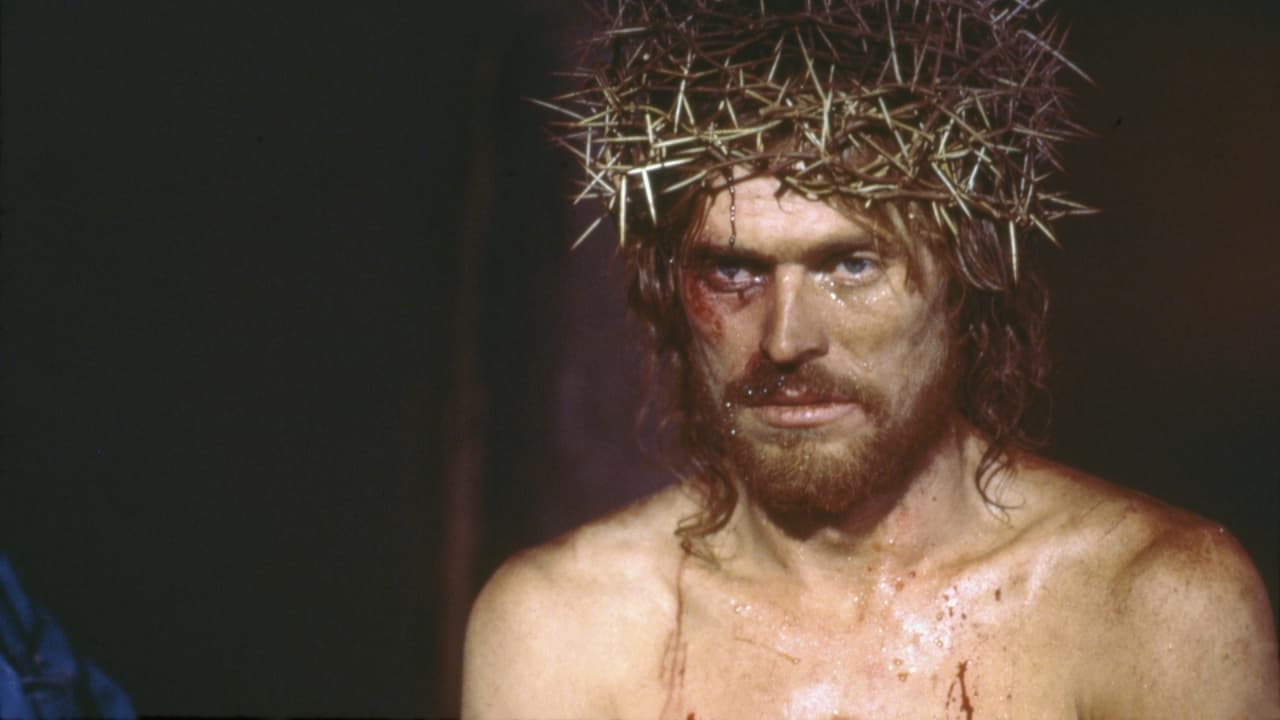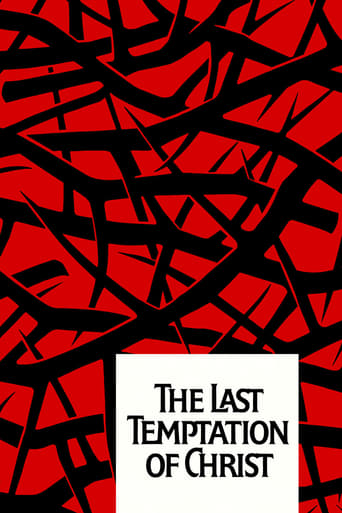

Anyone interested in religion and frightened off by all the negative hype in the 90's when this was released should see this film. The first time I watched it, out of curiousity, and although quite lengthy, (stick with it) the last hour will blow you away! With Keitel (Judas) and DeFoe, their combined presence is ample to engross the movie fan, add David Bowie's cameo and understated pilate and Peter Gabriel's score, Barbara Hershey, this is a film to be reckoned with and a profound experience...
... View MoreThere is a lot to like in The Last Temptation of Christ directed by Martin Scorsese. It is one of his most ambitious films. I'm huge fan of his work. This movie is in line with his other religious epic 'Silence (2016)'.I appreciated what the movie was doing. I loved the way Jesus was portrayed ,struggling like everyone of us. We feel his dilemma , his uncertainty , his self doubt. Willem Dafoe gives one his best performances in this movie.But as Jesus was struggling with his temptations of lust, doubt and fear, I was myself struggling with my own temptation to turn this movie off. It does get pretty boring in the middle and my interest was waning.Still I stuck with it till the end and I'm glad I did. It was one of the most rewarding experience. Well worth sitting through 164 mins for. I knew Scorsese wouldn't let me down.
... View MoreI do have to say how wrong this movie is. Some may agree with me, and many will not. However, I am not concerned with the argument many have with me, but concern is that the blasphemy in this film is deceiving many people, especially ones who already know Christ. Although I have problems with most of the film, mainly I'm annoyed with the second half of the film. The movie portrays Jesus not only running through trials and tribulation, but actually fell into temptation. The movie shows that Satan was able to trick Jesus by disguising himself as a little girl, and after seeing Jesus fall into temptation and marry Mary Magdalene and have sexual relations with her is purely disgusting. No where in the Bible does it say that Jesus had sexual relations with Mary Magdalene. No where in the Bible does Jesus defy God and follow Satan. The Good Word says, "Jesus cried out, 'Father why have you forsaken me'. It was only shortly after this Jesus gave up His Spirit and died." There is no jumping off the cross and joining the devil there. No! He died on the cross and after three days, He rose again. So where in that part of Scripture does Jesus marry Magdalene, and where does the Bible say he lived to be 80 years old?There is nothing in Scripture to support that. No my friends, when Jesus resurrected He carried on with the earth for 40 days before He was ascended into heaven. And the two angels stood near the disciples and said, "This same Jesus you saw going into heaven, will come back in the same way you saw Him go into heaven. I tell you the truth, if you think Jesus fell into temptation, then you are making Him and the Father to be a liar. Literally, anyone who thinks that Jesus had sex with Mary and married her and died at 80 is calling God a liar. For Jesus is the unblemished Lamb who was sacrificed for our sins, therefore, Jesus is sinless even on earth. If anyone does not believe this, they really need help, because I tell you now, the making of this movie was not prompted by the Holy Spirit, but by man's own fantasy through the prompting of demonic spirits.I'm not saying Jesus Christ is a fantasy, but this movie is. The way Jesus died in this film does not match the Word of God. Now, many people are wondering if I'm a child of God, and probably many are accusing me of being Satan's follower. Well, honestly if that accusation helps them sleep at night, then go right ahead, but I'm not going to believe them, for I believe in my Saviour, Jesus Christ, and I know deep down that He would not accept Satan's desires or be tricked by him in any way. The Devil is a liar and the father of all lies (John 8:44).Jesus had much to say to the Pharisees and Sadducees in Matthew 23. He woed them seven times. Maybe you should take a look.
... View MoreIMDb STORYLINE: "The carpenter, Jesus of Nazareth, tormented by the temptations of demons, the guilt of making crosses for the Romans, pity for men and the world, and the constant call of God, sets out to find what God wills for Him. But as His mission nears fulfillment, He must face the greatest temptation; the normal life of a good man. Based, not on the Gospels, but on Nikos Kazantzakis' novel of the same name." Written by Nick Lopez ([email protected])"He must face the greatest temptation; the normal life of a good man." But is it the life of a "good" man? The temptation is so powerful because it is presented so attractively. In his fantasy- temptation, the make-believe Jesus sees himself in ripe old age surrounded by many women and children, having fallen for the misogynistic lie "There is only one woman in the world.": In his imagination, he betrays his pregnant wife Magdalene, the woman who has loved him since girlhood, by simultaneously impregnating Mary of Bethany. He goes on to imagine that he sleeps with her sister Martha in Mary's absence. But most obviously, he is tempted to betray his best friend, his close disciples, his other followers, the trusting crowds of Jerusalem, to turn his back on them, to walk away into a lush Eden-like landscape, to escape and hide. At last, this imaginary life of a "good" man is dramatically revealed as a temptation when his guardian "angel of light" dissolves in a flare of Satanic flame. So the real Jesus rejects this temptation once he sees through it. He remains to die on the cross.
... View More